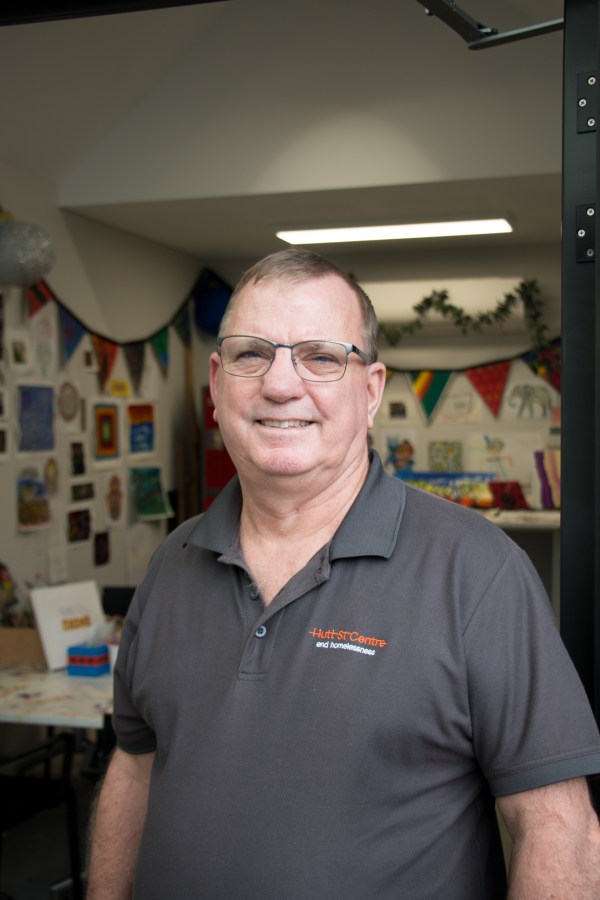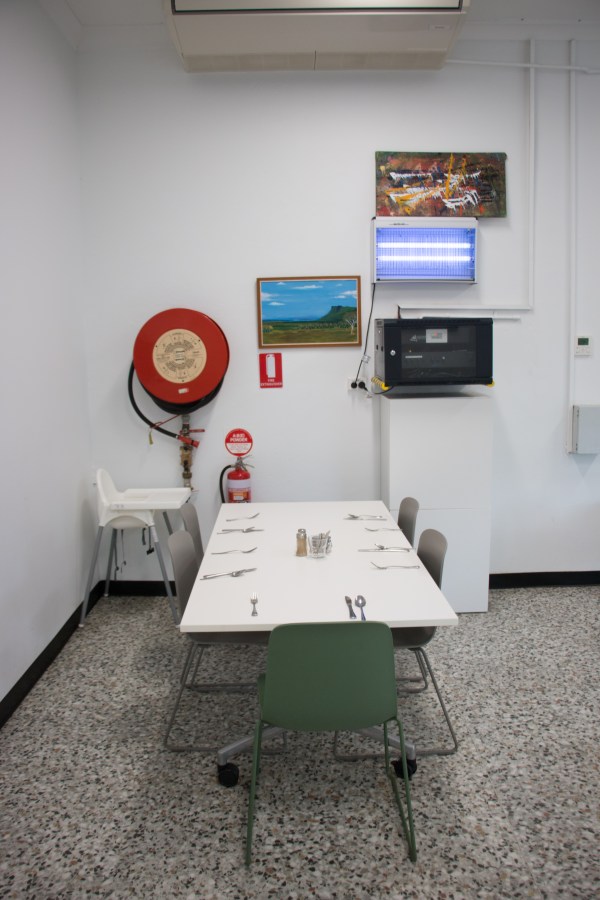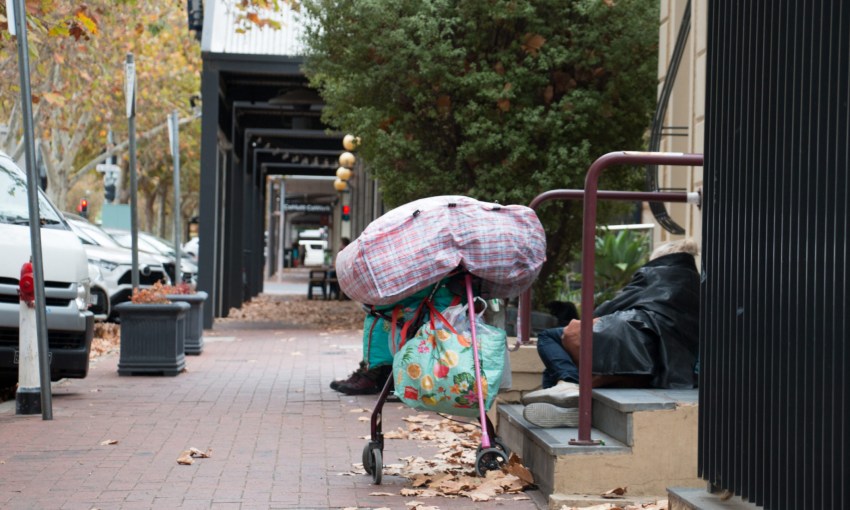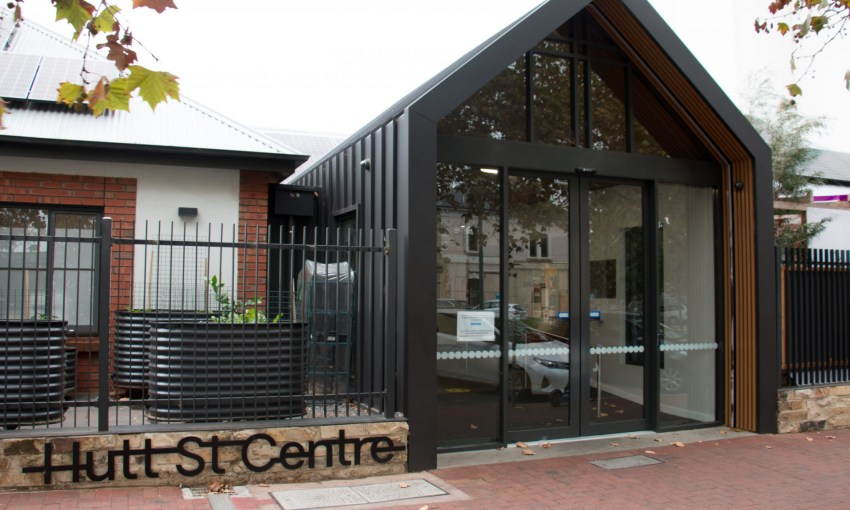Data from the Adelaide Zero Project reveals an increase of 33 rough sleepers in postcode 5000 from January—March 2022. Hutt St Centre CEO Chris Burns says the hub recently hit a new visitation record, and is seeing a rising number of female clients.
There’s been a three-month uptick in city rough sleepers
When the 67-year-old Hutt St Centre unveiled its $2.2m redevelopment in February last year, management quickly realised they needed to transform one of the newly built staff rooms into a space just for women and children, now called the Family Retreat.
The room – at the back of the homelessness hub, located in the city’s south-eastern pocket – includes a pull-out couch, changing table, miniature play set, and also has an outside garden flush with edible vegetables.
“We keep a very close eye on the numbers, and it was very clear to us last year the numbers were just going up,” Hutt St Centre CEO Chris Burns tells CityMag.
“When I first started, we would have had about between 10 and 15 per cent of our clients were females. At the moment it’s 35 to 40.
“If you go near the end of last year, when COVID was in full swing, we probably struggled to get more than 100 people coming to the centre every day. It’s not surprising now if we get 140 every day.”
New here? Sign up to receive the latest happenings from around our city, sent every Thursday afternoon.
To address the growing homelessness crisis in the city, on Monday the State Government announced it would pump more multi-year funding into three specialist homelessness providers – Hutt St Centre, Catherine House and Vinnies SA.
“We cannot, in good conscience, stand idly by and allow hundreds of vulnerable people to sleep rough – in doorways, on park benches and under trees – around the city each night,” Premier Peter Malinauskas said in a press release.
Although the most recent data collected by the Adelaide Zero Project for the months of January—March 2022 reveals “new people” actively homeless had decreased by 12 individuals (totalling 264), the total number of rough sleepers and those seeking temporary shelter had grown.
People sleeping rough increased by 33 people in March (from 122 to 155) and those temporarily sheltered had increased by 30 people (from 59 to 89).
The definition of ‘sleeping rough’ and ‘homeless’ differs slightly. Someone who is homeless could be staying in temporary accommodation, while someone sleeping rough does not have a proper roof over their head.
As part of this week’s announcement, the Hutt St Centre will receive $500,000 per annum by the State Government, equating to $2m over four years. The aim, according to the government’s statement, is to reinstate funding for services that had their funding slashed last year by the Liberal government.
Last year’s cuts were part of the formation of the SA Homelessness Alliances – an SA Housing Authority change, spearheaded by the former Hutt St Centre CEO, Ian Cox, aiming to streamline and integrate state-wide and regional homelessness services.
Organisations had to apply to be part of an Alliance, with the Hutt St Centre – along with Catherine House and Vinnies SA – being part of an unsuccessful application. As a result, the organisation lost $1.2m, with Chris saying they were forced to let go of 20 full-time case managers.

Chris Burns
Chris – also a veteran, with experience working in the mental health sector – wants this new funding to fill holes and allow the organisation to work alongside existing partnerships.
“We’ll work with the Alliance because we know where the gaps are. Literally, we are at the coalface,” he says.
“The four things clients want when I first got here, it was probably a warm meal, hot shower, a change of clothes and to charge their phone. We address that immediately.
“But then we have a nurse here every day. We have GPs who visit pro-bono. We have lawyers providing legal advice, financial counsellors – all pro-bono. We get them hearing tests, pedicures, haircuts.”
Walking around the Family Retreat room, Chris explains his understanding of the increasing number of new female clients at the centre, which he describes as an economic consequence of COVID-19.
“We are seeing a lot of women who are in their late 30s to late 50s, and they will have come from being casual or part-time in retail and hospitality,” Chris says.
“Probably a relationship breakdown somewhere, and no superannuation, or cashed-out their super during COVID. People think there’s lots of jobs in retail and hospitality at the moment, [but] they don’t hire older ladies.”
Greens MLC Robert Simms said in a separate press release this week, the SA Greens welcomed the restoration of money for the organisations and the government’s promise to spend $180m building 400 new public-housing homes — but more investment was needed.
“Four-hundred new public homes is simply not enough to deal with our state’s housing affordability crisis,” Simms said in the press release.
“With rents continuing to soar and more South Australians living on the streets, the Greens are calling for a big investment in public housing in the first Malinauskas budget.”
Data released today by AnglicareSA shows affordable rental options for those on minimum wage, JobSeeker and the pension have all but disappeared in South Australia.
The study examined 1125 rental properties over the March 19 weekend and found two were “affordable and appropriate” for a single person on minimum wage; no rentals were affordable for a single person on JobSeeker, Youth Allowance or the Aged Pension; and four properties were affordable for a couple on JobSeeker with two kids.
Chris says the organisation has felt and is still feeling the tight squeeze of the private rental market.
“People are being dislocated from rental properties,” he says.
“People are still losing their jobs, or have lost their job in COVID and now can’t get re-employed. There’s a little bit of a downward spiral once you start getting into homelessness, if you can’t look after yourself, if you can’t keep yourself healthy.
“At the moment, our numbers are still going up. We hit a record two weeks ago where we had 700 clients in a week.
“There is still a consequence of COVID that’s being felt.”

Chris estimates the Hutt St Centre churns-out 100 meals over its one-hour lunch period on Mondays
If you or someone you know is experiencing domestic violence call 1800 RESPECT on 1800 737 732





